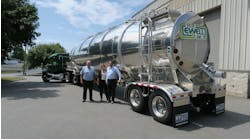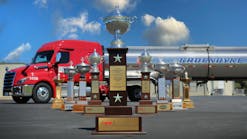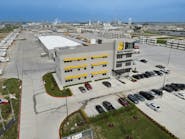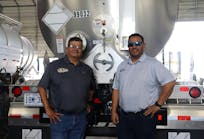DONEL “Buddy” Whiting was a professional airline pilot in the early 1970s when he decided to trade in his wings for wheels, starting his own one-man distribution company in 1974 that sold cleaning chemicals for trucks. Over the next decade, he added staff and began selling larger automated wash systems.
In the early days, the equipment would arrive from countries as far away as Germany and Italy, but after five years of distributing someone else’s equipment, Whiting decided his company needed a change in direction. It was time to build his own wash systems.
“We realized after four to five years of buying equipment to re-distribute, we either needed to get into the business of manufacturing everything or get out of automated systems altogether,” Whiting says. “We evolved into an equipment manufacturer out of necessity more than anything else.”
The Alexander, Arkansas-based company didn’t have to search far for business as quite a few trucking companies are based out of northwest Arkansas, including a number of food haulers. Still, Whiting Systems decided to expand its focus from solely trucking operations to freight trains, passenger trains, city buses, garbage trucks, and recreational vehicles.
The customer base for those systems quickly spread across the country, including installations in Chicago, Illinois; Baltimore, Maryland; Denver, Colorado; and Los Angeles, California. But as the trucking industry began slowing down when the economic downturn of 2008-2009 hit, Whiting noticed another market that was picking up steam.
“We are not market-driven, but we follow the needs,” he says. “While trucking is still a major part of our business, our growth has been in the mining industry and oil and gas exploration.”
New territory
Entering the mining and oil and gas industries brought new opportunities, as well as new challenges. The requirements to wash the mud, dirt, oil, and grease off the vehicles used in those environments are different from what is required to wash road film off a tractor-trailer unit or the industrial pollution off a train.
Soaring higher page 2...
“One shoe never fits all,” says Whiting. “The biggest challenge is evaluating what your needs are, what cleaning needs to be done, and adjusting the delivery system for the chemicals being used in that particular application.”
The vehicles used in these new markets are very specialized and must be washed by touchless systems that have no brushes. By comparison, traditional trucking fleets prefer a three-brush rollover system. In order to properly wash the odd-shaped vehicles used in fracking, for example, Whiting must provide a system that delivers high pressure, comprehensive chemical coverage, and a lot of water.
In order to meet those demands, Whiting needed a precise chemical metering pump that he could run efficiently at varying capacities based on the type of material needing to be cleaned off a vehicle. In early 2012, the solution to Whiting’s needs walked through his front door.
Better pump
Leland Dyson of Ace Engineering has been a long-time independent sales representative for Neptune Chemical Pump Co, North Wales, Pennsylvania. He had sold Neptune pumps to Whiting dating back to the 1990s, although Whiting had not used Neptune pumps recently. Dyson returned to Alexander with Kevin Hogue, Regional Sales Manager with Neptune and Pump Solutions Group (PSG).
The trio discussed Whiting Systems’ evolving business needs in terms of the new markets it was serving, and Whiting expressed concern over his existing pumps; specifically, the metering adjustment screw on the pumps.
“If there’s a pump in the field with an adjustable knob on it, anyone can set it to a different position and we have no way of controlling it,” he says.
Dyson and Hogue described an ideal solution to that problem: the Neptune 7000 Series Mechanical Diaphragm Metering Pump. The 7000 Series offers higher capacities, suction lift, and capabilities than the Neptune 500 Series pumps that Whiting had previously utilized.
Soaring higher page 3...
“It was through diligent discussion and sharing the breadth of our product offering that Buddy found a piece to the puzzle that he may not have realized was even there,” says Hogue.
The mechanical design of the 7000 Series eliminates the use of contour plates on the liquid side of the diaphragm while the simple, straight-through valve and head design allows for improved characteristics. The 7000 Series features pressures to 150 psi (10.3 bar) and capacities to 300 gallons per hour (1,136 liters/hour), and perhaps equally as important to Whiting, suction lift exceeding 20 feet (6.1 meters) on water-like chemicals. The units provide superior performance when pumping chemicals that can off-gas, such as sodium hypochlorite, and can easily handle viscosities in excess of 5,000 cPs.
After diligent follow-up by both Hogue and Dyson, Whiting purchased and installed six 7000 Series pumps on his wash-down systems in June of 2012. After getting excellent feedback from his customers, he began purchasing more units to meet the growing demand in the oil and gas and mining markets where the Neptune pumps and Whiting wash-down systems were being used.
“These Neptune 7000 Series pumps give us very little service problems and that’s what we like,” Whiting says. “They do a good job, and that’s what we want. They are easy to prime, they go to work, and we’ve had no failures in the field. Out of the box, they are working, and that’s good.”
Continued success
The former one-man show has grown his business into a multi-million dollar company with roughly 80 employees around the country. Approximately 55 of those employees work at Whiting Systems’ headquarters in Alexander, which boasts three buildings totaling 50,000 square feet on approximately six acres.
Over the past six to seven years, the privately-held company has doubled in size, including a strong 40% growth since 2009 primarily due to its oil oilfield service, rail, and residual business. To meet the demands of its growing mining and oil and gas businesses, Whiting Systems opened a branch in Minot, North Dakota to better serve its large customers in the Bakken shale oil region. Whiting Systems also plans to open a branch in the Williamsport, Pennsylvania area. And despite the majority of its business being in North America, Whiting Systems has begun receiving orders for its equipment from as far away as Europe and the Middle East while aggressively pursuing opportunities in Central and South America.
“What sets us apart is that we are known for building top-of-the-line equipment worldwide,” Whiting says. “Our structures and frames are all stainless steel. We put top-of-the-line components in everything that we do, and that includes using Neptune pumps rather than sloppy chemical metering systems like most of our competitors.”
The aviator-turned-entrepreneur remains deeply involved in Whiting Systems’ day-to-day activities as chief executive officer, while his son Russ serves as president. Love and passion for the business runs deep in the Whiting family, and with Buddy and Russ in the pilot seats, the sky’s the limit for Whiting Systems. ♦
About the Author
Alan Dickel is Manager of Customer Service at Neptune™ Chemical Pump Co. He can be reached at 215-699-8700 or [email protected]. Neptune Chemical Pump Company is a premier manufacturer of chemical metering and peristaltic (hose) pumps, chemical feed systems, chemical injection accessories, make-down systems, industrial mixers, plus steam and water sample analysis panels. Headquartered in North Wales, Pennsylvania, Neptune is a member of Dover Corporation’s Pump Solutions Group (PSG).








